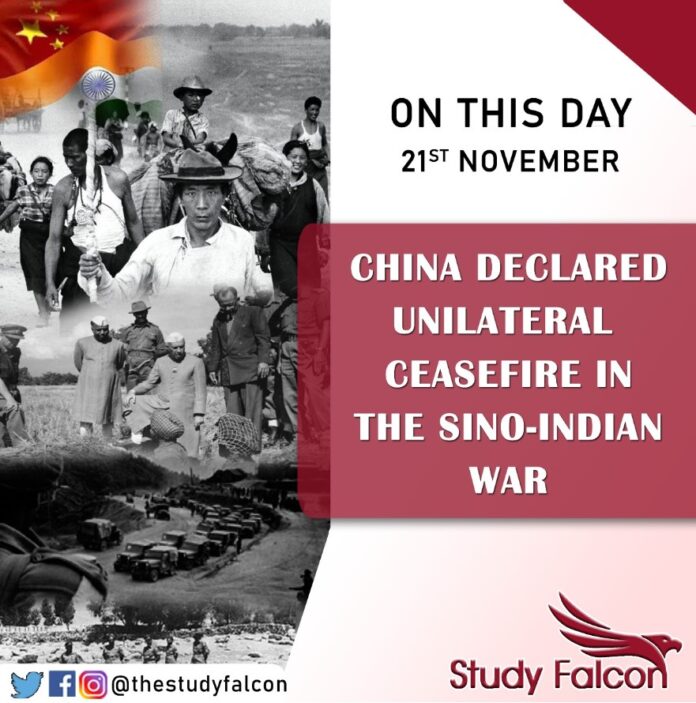On November 21, 1962, after a month of fighting along its border with India, China declared a unilateral ceasefire, bringing to an end the Sino-Indian War.
India and China fought a war in 1962, but the border issues have lingered on, with Beijing claiming the Indian state of Arunachal Pradesh and New Delhi considering China-controlled Aksai Chin as its territory. The last major border tension occurred in 2014, when Chinese troops reportedly entered Indian territory in Ladakh. The standoff was resolved after three weeks.
Since 1953 onwards, Leh (Ladakh) and its frontier check posts had been entrusted to CRPF. This was the time when Indo-China border was not militarised, and the 2500 km Indo-Tibetan border was manned by police personnel of ITBF & CRPF. The only Army Garrison was in Leh. It was believed that there is no threat from “friendly” China.
During this time China completed the strategic development of construction of a highway through a traditional caravan route passing from Sinkiang to Tibet via Aksai Chin. Not only did they publicly announce the completion of highway but The People’s Daily, in October 1959, published a map of the region showing Aksai Chin as Chinese territory. PLA also moved in and established itself.
On the fateful day of Oct. 21, 1959, 10 valiant Police personnel laid down their lives fighting at 16,000 ft altitude, in extremely cold conditions and against all odds, in an unequal combat with heavily armed Chinese troops. As recounted by Shri Sonam Wangyal “they were about 200-300 in numbers. When the two sides came face to face, a standoff ensued and eventually the Indian patrol was surrounded and outnumbered by Chinese troops”. Before actual action commenced, Shri Sonam Wangyal recalled “Chinese Commander and Karam Singh engaged in a showdown with both vehemently claiming the area and asking the other to retreat…. This continued for three hrs and suddenly Chinese side started firing.”
In intensely cold and harsh terrain, Policemen went way beyond their duty to protect the nation from heavily armed Chinese forces. The valour of Police Jawans fighting at 16,000 ft. altitude, in freezing conditions and against a well-equipped and heavily armed army regiment, is a rare saga of courage and commitment to duty.
A slow forward move towards the McMahon Line was begun on the ground, to establish a new de facto boundary. The McMahon Line was then forgotten until about 1935 when the British government decided to publish the documents in the 1937 edition of Aitchison’s Collection of Treaties. The NEFA (North East Frontier Agency) was created in 1954. On 7 November 1959, Chou En-lai proposed that both sides should withdraw their troops twenty kilometers from the McMahon line. The issue was quiet during the decade of cordial Sino-Indian relations, but erupted again during the Sino-Indian War of 1962. During the 1962 war, the PRC captured most of the NEFA. However, China soon declared victory and voluntarily withdrew back to the McMahon Line.
The war lasted just one month but killed 1,383 Indian troops and 722 Chinese troops. An additional 1,047 Indians and 1,697 Chinese were wounded, and nearly 4,000 Indian soldiers were captured. Many of the casualties were caused by the harsh conditions at 14,000 feet, rather than by enemy fire. Hundreds of the wounded on both sides died of exposure before their comrades could get medical attention for them.
In the end, China retained actual control of the Aksai Chin region. Prime Minister Nehru was roundly criticized at home for his pacifism in the face of Chinese aggression, and for the lack of preparation prior to the Chinese attack.
The primary cause of the 1962 war between India and China was the disputed border between the two countries, in the high mountains of Aksai Chin. India asserted that the region, which is slightly larger than Portugal, belonged to the Indian-controlled portion of Kashmir. China countered that it was part of Xinjiang.
The roots of the disagreement go back to the mid 19th century when the British Raj in India and the Qing Chinese agreed to let the traditional border, wherever that might be, stand as the boundary between their realms. As of 1846, only those sections near the Karakoram Pass and Pangong Lake were clearly delineated; the rest of the border was not formally demarcated.
The 1962 war remains a traumatic moment in Indian memory. An important consequence of the war was that India recognised the holes in its military preparedness and modernised its defence forces. Most experts believe that India was militarily and strategically underprepared for the war. Decisions by the Indian side like not using the air force to target Chinese positions have been criticised by some military observers. However, there are differences over who was to be blamed most for the debacle, and how much of the blame should be laid at the door of the prime minister.










